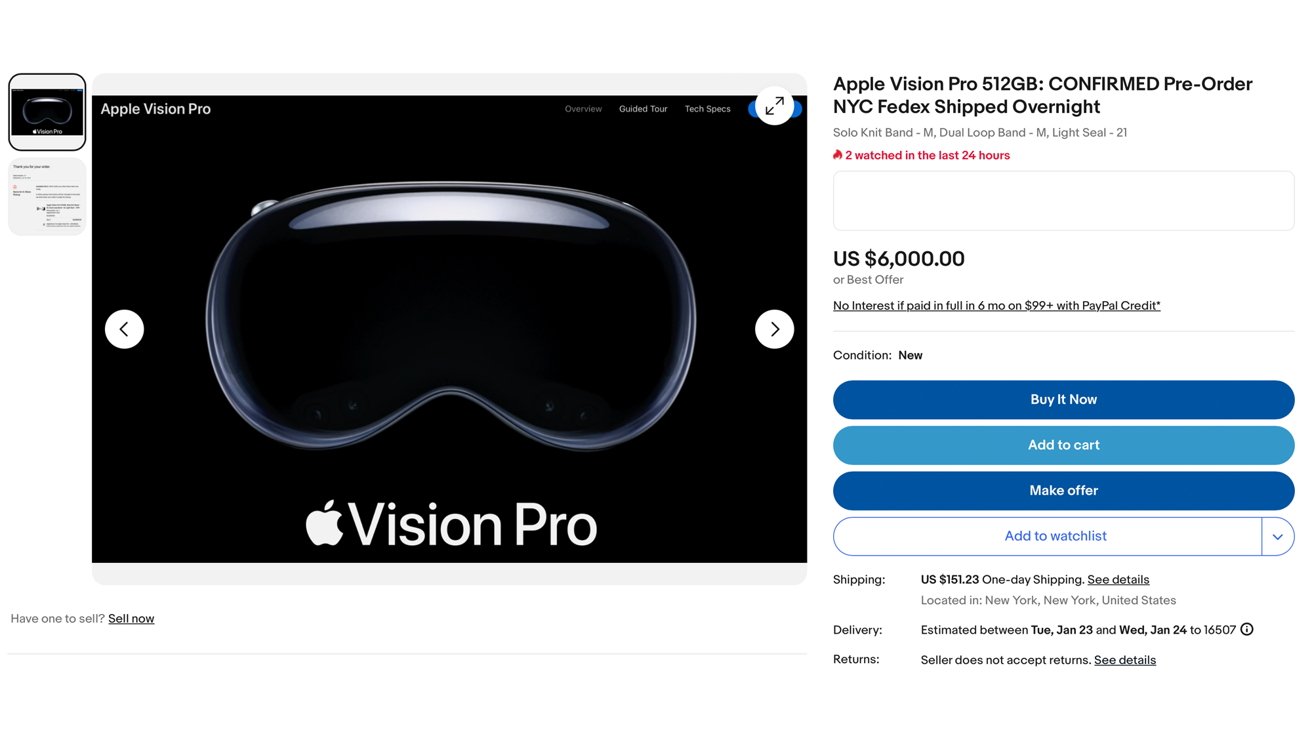Apple Vision Pro and Taylor Swift have one thing in common — bots
No one was surprised that the Apple Vision Pro sold out nearly immediately. However, it's worth taking a look at what was behind the purchases.
Kasada, a bot mitigation company, discovered that scalpers used bots to successfully order thousands of Apple Vision Pro headsets, in much the same way that concert tickets are snatched up before fans can buy them at face value. Most notably, in the case of the Apple Vision Pro, they seemed interested in the base 256GB model.
The company monitored betting communities, noting that many seemed interested in the Apple Vision Pro as a big scalping opportunity. Bot developers updated existing bots and created new ones designed specifically to buy the Apple Vision Pro.
While it seems like the requirement of Face ID would stop bots dead in their tracks, that didn't appear to be the case. As it turns out, many of the scalping bots were hardcoded with the developer's face scan value.
Of course, this meant that the Apple Vision Pro ordered would be sized to fit the developer's head, not the head of anyone purchasing the device. And naturally, most of the resellers don't accept returns on the devices, either.
The Apple ID requirement was also not a deterrent. Kasada points out that this was likely due to scalpers obtaining a combination of new and existing Apple IDs before the event.
Reseller prices are well over what you'd pay should you order the Vision Pro from Apple directly. If purchased from Apple, you'd have to fork over $3,499 for the base model with 256GB of storage. For 512GB, the price is $3,699, and for a 1TB edition, it's $3,899.
Currently, resale prices still vary wildly from seller to seller. However, certain sizes seem to be trending higher than others, with Kasada noting that "those with the largest light seals are currently up for sale at the highest markup, with a price of $9,000 for a U.S. Small Band, 33W Light Seal."
 Amber Neely
Amber Neely















 Thomas Sibilly
Thomas Sibilly
 AppleInsider Staff
AppleInsider Staff
 William Gallagher
William Gallagher
 Malcolm Owen
Malcolm Owen
 Christine McKee
Christine McKee










3 Comments
The face scan isn't a deterrant anyway. Apple’s return and exchange policy lets the end customers swap them out for the correct sizes at the store.
Quote:
PCMag gained access to one chat group devoted to scalping, where tips on reselling the Vision Pro were shared widely among members in the days leading up to the start of preorders. “Reminder Apple has a very generous return window, you can always send it back within the month if you can't get that quick flip,” one reseller told the group...
“We aren't expecting to make thousands from one of these locally, but if you have connections to export, you will make f...ing bank,” one scalper told his group.
And yet more negative spin on Vision Pro from AppleInsider. It's averaging about a story a day. So let's slice and dice this particular bit of nonsense, shall we?
The subhead states that AI is going to take a look at "what was behind the purchases" of the Vision Pro sell out. Not "a small portion of the purchases" or (even more correctly) the "tiny percentage of bot purchases." It doesn't even allow for "some" of the purchases... AI goes with, "the purchases" as in all of them. Wow, I guess AI is about to reveal that this whole "sell out" story is not what it seems!
AI then notes that Kasada discovered that scalpers used bots to purchase "thousands" of Vision Pros. Wow, sure sounds like a lot! But... how many thousands? Because 2,000 and 50,000 can both be described as "thousands." Fortunately, Kasada actually provides an answer on their website, which AI conveniently leaves out, noting that it had detected "several" thousand bot purchases. Well, several is usually defined as a number between 4 and 6. So, let's go with 6,000 units, which would be 3.3% of 180,000. Hmmmm... doesn't sound like much of a story any longer, does it? But we're not done yet!
Yes, Kasada is a company hired by other companies to do bot mitigation. But since Apple is not its client and since all Vision Pro sales were controlled very tightly by Apple, how does Kasada have any accurate insight whatsoever into bot activity as it relates to Vision Pro sales? "Kasada threat research" is as specific an answer as they provide.
Not surprisingly, the "source" that broke this story is Kasada, itself, in a company blog post. Hmmmm... let's see... now if you're a bot mitigation company looking for free publicity to attract new clients, how might you do that? Surely you wouldn't go with a a story speculating about thousands of bot purchases in one of Apple's most important and anticipated product launches in its history. Nah... nobody would care.